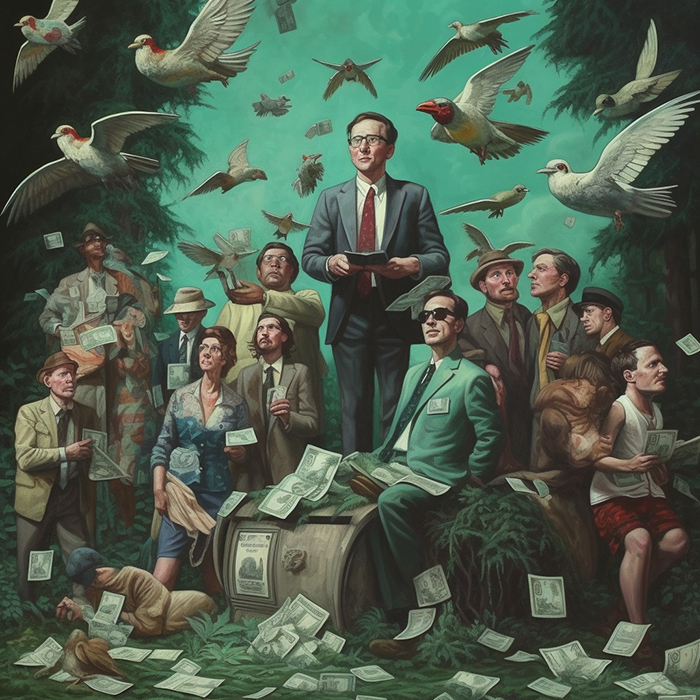Why trying to be what others like rarely work in making friends
This post is written for a person who feels the need to deliberately change their personality to fit into a new group or a relationship. They would consider it a good tactic to change the way they dress, alter their opinions, interests, and hobbies to match a new group of people. You may have been “ousted” as “a fake” or been accused of faking it or pretending to be something. This post is to explain why this happens, and why many people react so negatively to your offer of friendship and showing them that you like them.
Background
Just to check I’ve understood you correctly, and that we’re talking about the same thing before I answer.
From your perspective, you see a new group of people or a new person who you like. You feel like you want to be friends with these people, but as they all have a certain “thing” you feel like you wouldn’t fit in looking the way you look and doing the things you do. Also, you know that other people change the way they are to fit a stereotype or a subculture, so you assume they are doing the same thing as you. I admit, the difference is very subtle, but it exists.
You may cram information similarly to preparing to a test at school. You may learn the lingo you need to know and mimic the way these people dress in order to mimic it well enough to fit in. You believe this will be met with a feeling of being flattered, after all, you changed everything you are to be like these people.
You may also have a clear role model, you might know that these people like a certain person, so you try and mimic that person to the best of your ability, to make yourself as closely similar than that person to gain their favor.
Your attention is with the people in the group, one or several; you want to be friends with these people specifically. And therein we have the first clue:
“Fakes” focus on people, the “real things” focus on the ideology
Many subcultures are ideological in their core. These subcultures include, but are not limited to everything from the neo-nazis, to rock fans, from nature activists to feminists, from artists to philosophers, all of these groups have a mutual ideology behind their subculture. The least obvious ideology here is the rock fans, but they’ve got one. It is the music, the love of the music, but it is very subtle, very difficult to define, even for the fans themselves. (I could go into detail, but that would derail this post.)
A fake sees an individual and wants to impress that particular individual and make friends with that person. The real person may look at other individuals and admire them, take after them to a large degree and use them as role models, but they wouldn’t attempt to make friends with that particular person, but they’d seek company in other people with similar fascination toward whatever this individual is into, or, more likely, several individuals who are interested in the same thing, such as rock. So “the REAL thing” would collect influences from SEVERAL individuals to signal alliance to other, non-specific people in the same subculture, whereas the fake simply wants these specific individuals to like them. This causes them to use shortcuts to get in, as their focus is on ONE person or one group of people, and they are not, necessarily even mildly interested in the ideology that these people are focussed on.
The fake will change style if they don’t make friends
The fake person will change styles and ideologies if they don’t make a connection to this particular person. The real thing won’t. They don’t have a specific target, but they keep hanging out with people of the same genre regardless of the particular relationships to the other members. They may date people, break up with people, and no matter how many friends they’ve made and lost, they’ll STILL keep interested in the same ideology.
Shallow knowledge without passion
The real things will show genuine passion towards the mutual interest. They know a lot of stuff, because they didn’t just pick this interest up last weekend just because they wanted to make friends, they may have spent YEARS as an outcast without friends, very much DUE TO their interest in whatever they are interested in, be it playing cricket or collecting stamps, they might have been cast out of other groups because of their weird interest in the topic, but because they are not in it to make friends, they are in it for cricket or stamps, and that makes them the real thing. They consider the ideology to be more important to them than shallow friendships and approval.
The people with a deep interest in any topic will sniff out a fake very quickly. They may not say anything, but they’ll be rolling their eyes at each other when they reveal they’re “a clothes rebel” or “fashion activist”. Although the clothes are important to signal ideological affinity, and they function as a type of a mating call for people of the same interest group, it is not enough to wear the right clothes or saying the same things without actually knowing what it is that you are talking about on a deep, real, personal level.
There’s a learning curve a real thing goes through
The way the ‘real things’ take up a new ideology takes a bit of time. First, their interest towards something specific awakens. I’ll use myself as an example again:
At the age of 14, I think, I heard a piece of music by the band Extreme. It was their freshly released single More Than Words, and I loved it so much I went and bought the album without hearing one other song on it. I got a bit of a shock when I played it, instead of lovely love songs, the album was filled with fuck metal, along with that beautiful ballad. I wasn’t quite sure what to think of it, but I listened to the album a few times over, just to wrap my head around it. About the fourth time, it started to sound really freaking good. I LOVED the challenge of working it out. All music I had heard so far was easy. Simple. It would open up the first hearing, it and it would be forgotten soon. It was a fabulous brain work out, and I STILL remove points of any rock album that I like the first hearing. If I like it, it means it was too simple to begin with, and it will wear out fast. I still listen to that album to this day with my brain working overtime to catch every note.
Little by little, I found other bands that I liked, even though nothing, not even Aerosmith, compared to Extreme. But they all had a thing. All of the bands that I fell in love with sounded nothing like any other band. I was like a sponge trying to learn what this whole genre was about, but I was always a little embarrassed about my former nerdiness and felt I was so very much in the wrong group.
After a while, I started to feel weird in my pink and salmon clothes and blue jeans, but I felt I wasn’t quite a full-fledged rock fan yet. I felt I was very green in it, and I thought the kids who had listened to rock since they were 12 would die in a fit of laughter if I would go to school wearing rock stuff.
I started knowingly and gradually change from my “normal kid” clothes toward a more rock style. I didn’t make the full transition until 16 when I changed schools and the number of kids I already knew was limited to 5… And they weren’t people whose opinion I cared about, the rock kids I felt embarrassed to show this to, went to a different school.
The way I felt was: “I’m sorry. I apologize, but… I like rock, too.” This was never about trying to make friends with these people, per say, but rather to not be confused for a person who didn’t like rock. Everything about rock appealed to me. My clothes only said so. Later, when I got more comfortable with my new style, which happened relatively fast, their purpose was to say: “I’m one of you, I feel the same way, feel free to approach, I won’t bite.” (And granted, the opposite, too. “If you don’t get it, fuck off.”
But… I also always wanted to include “a thing” in my style. Something to say that I rebel even against the rock stereotype. :p You know. “I love you, but fuck you and your expectations, too.”
The girl-romantic “I’ll show you how to dress for the subculture” idea
There’s this idea between girls that girls help each other gain approval by teaching each other how to dress. Let me tell you… That idea makes me want to puke. Although I had a best friend, I never showed her how to dress in the rock style or how to pass for a rock fan, because she wasn’t one. She listened to the New Kids On The Block and fucking Billy Ray Cyrus, there couldn’t have been two groups more embarrassing than that if you had tried to find some. But she had NO IDEA what rock was about, and I wasn’t going to help her fake it.
At some stage, I started toning my rock style back down again as a natural reaction to my environment in which music was less prominent. I started feeling like a fake dressing like a rock fan when I didn’t even own a stereo to listen to music on. I feared one day some sexy rock dude would ask me about my clothes, and I’d have to confess my involvement with rock was very, very sporadic. I found rock again in my mid 30’s, and it came rushing back like it had never been away at all… And out comes the regalia! (All I want to know, where is my Lil’ Jack Horny T-shirt?!)
A better approach to making friends with subculture folk
People want to know they are with like-minded folk, and if they sniff “a fake” they don’t know what this person wants and why. It is BETTER for ANYONE to approach a group of enthusiast wearing their own real clothes and show a real interest in what they are about than to mimic their way of dressing and talking. People hate that, but they LOVE someone being curious about them and their way of thinking. It may sometimes be even more flattering to have someone who has no idea of what these people are into show interest in what they are into.
As an example, I always admired my open-minded great aunt for being so curious about the youth culture. She never pretended to know anything, but she was all ears wishing to hear all about it. She was fabulous. Sorry, is, gladly, she’s still with us, always looking about 10 years younger than what she really is, mainly because of her fantastic curiosity toward other people and their way of thinking.
Also read: Fashion is a language, ‘a look’ is a lie
Subscribe to get a Daily Message
*) Term changed after this post was originally written. Fractions of old terms may exist elsewhere in the post. Read about term updates.
**) Narcissists are Young Souls left alone to survive and they're doing their best. Their emotional age ranges from 3 to 17 -year old. The younger, the more severe the narcissism.
© 2001-2024 Copyright Sebastyne - CRC-32 ecd1f512. - All rights reserved.

